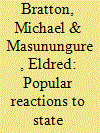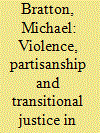| Srl | Item |
| 1 |
ID:
119122


|
|
|
|
|
| Publication |
2013.
|
| Summary/Abstract |
THIS BRIEFING EXPLORES SOME POLITICAL IMPLICATIONS of the current boom in information and communications technology (ICT) in sub-Saharan Africa. As a striking manifestation of globalization, perhaps half of Africa's one billion people are now signed up as subscribers to cellular telephone networks.1 Africans are enthusiastically adopting mobile phone technology, here called 'cell' phones. By foregoing landlines in favour of advanced telecom systems, their choices of technology are leapfrogging over other parts of the world.
|
|
|
|
|
|
|
|
|
|
|
|
|
|
|
|
| 2 |
ID:
077656


|
|
|
|
|
| Publication |
2007.
|
| Summary/Abstract |
In May 2005, the government of Zimbabwe launched Operation Murambatsvina (OM), a state-sponsored campaign to stifle independent economic and political activity in the country's urban areas. This article employs a national probability sample survey to analyse the popular reactions of ordinary Zimbabweans to this landmark event. It shows that the application of state repression succeeds at some goals, fails at others, and has powerful unintended effects. We report that the scope of OM was wide and that the main victims of OM were younger, unemployed families whom state security agents saw as potential recruits for social unrest. Whereas OM undoubtedly disrupted the informal economy, we show that it did not succeed in banishing urban dwellers to rural areas or permanently shutting down illicit trade. Moreover, the crackdown thoroughly discredited the police and other state institutions. We also demonstrate that state repression emboldened its victims, deepening polarisation between political parties and fortifying the ranks of Zimbabwe's opposition movement
|
|
|
|
|
|
|
|
|
|
|
|
|
|
|
|
| 3 |
ID:
106963


|
|
|
|
|
| Publication |
2011.
|
| Summary/Abstract |
What determines people's willingness to consider punishment for human rights abusers? This article investigates this question in the context of Zimbabwe in the aftermath of the country's violent presidential election campaign of June 2008. Based on a national probability sample survey, the paper shows that exposure to violence was reportedly widespread and that attitudes to transitional justice are mixed. In considering how to handle abuses, Zimbabweans weigh the pros and cons carefully and, recognising that peace and justice are difficult to obtain simultaneously, generally prefer the former. The article analyses the various factors that together predict a citizen's proclivity to claim transitional justice in its most demanding retributive form. Reflecting power relations, the results indicate that political partisanship is almost as important as individuals' personal experience of actual and threatened acts of violence.
|
|
|
|
|
|
|
|
|
|
|
|
|
|
|
|